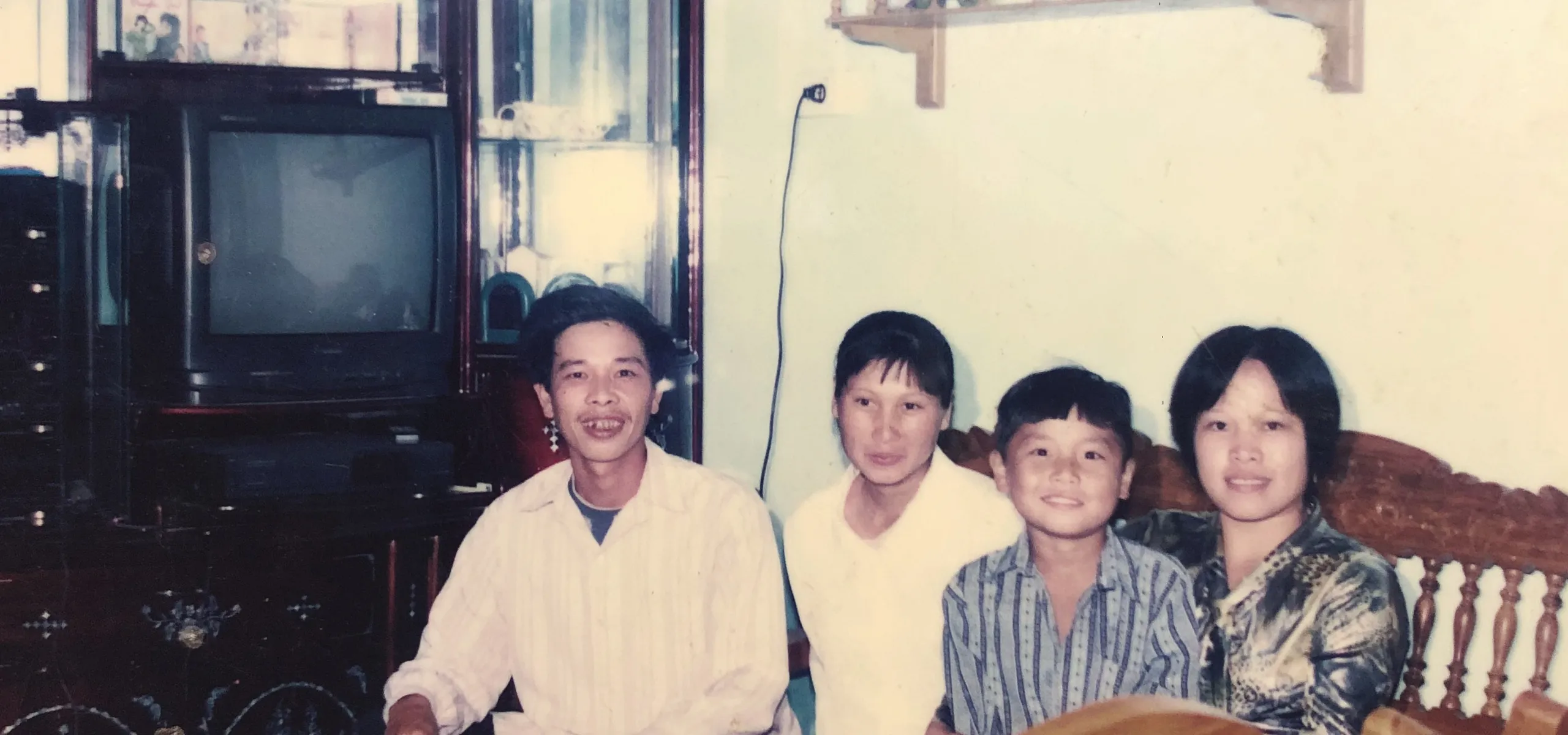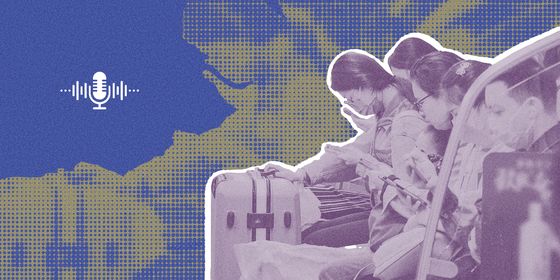One woman's story of being trafficked from Vietnam and sold for marriage in China
-1-
Destiny’s station
My name is Yuanxiao and I’m 24 years old. I’m currently working in Guangzhou.
My mother was born in the north of Vietnam near Ha Long Bay. There were ten children in her family, and she was number eight.
After finishing primary school, she had to help my uncles look after their kids, so she dropped out. But she craved independence and wanted to go out and prove herself. She heard through a friend that if she came to China she could make money working a factory job, so she came over.
She never imagined that she would be sold to an overseas Chinese farm in western Guangdong.
These farms were originally set up to resettle Chinese expatriates who fled Vietnam in 1978 during the anti-Chinese movements. Because they were frequented by many people who spoke both Chinese and Vietnamese, some of these farms became way-stations for trafficking Vietnamese brides. Men from rural regions of China who needed a wife would come here and select their bride-to-be.
In my mom’s recollection, there were seven or eight Vietnamese girls with her at the time. The younger ones were 13 or 14, the older ones 20 to 30. The vast majority had been tricked into coming, though there were some who couldn’t get married in Vietnam for various reasons and chose to come here voluntarily.
The farm bosses would beat them and starve them. One of the girls didn’t want to be married off, so the boss took her out to a cornfield and threatened her with a knife, saying, “Are you getting married or not? If not, I’ll run you through with this knife and kill you.”
My mom said she felt at the time that half of her was already dead. She was full of despair for the future.
She was quite good-looking when she was young, though she had a slight build. In the villages, they believed young women should look strong, or have curves suitable for bearing children. My mom clearly did not fit these standards, so nobody chose her.
My dad was probably the fourth man that my mom saw. Her first impression was that he was very tall and skinny, didn’t like to smile, and looked rather like a male chauvinist.
At first, my dad didn’t pick her. He had his eye on another, stouter woman. But the relative who brought my dad over said that my mom looked more kindhearted, so in the end he chose her.
They took the bus back to town, and didn’t have much of a marriage ceremony. Because my mom had entered the country illegally, they never got a marriage certificate, and her name never appeared in the household register.
My grandmother gave my mom 50 kuai and had my aunt take her to buy a new set of clothes and two sets of undergarments as wedding gifts.
That was in 1992. My dad was 29, and my mom was 17.
-2-
Bought for 2,800 yuan
We were so poor back then. Even the 2,800 yuan that was borrowed to buy my mom was later repaid through her own labor. She recalls that the period of time before my brother and I were born was the most bitter.
She didn’t become pregnant right after getting married, and during that time relatives were always saying, “Why isn’t she pregnant? Is she unable to have kids? If she can’t have kids you should hurry up and exchange her, get her sold.” Even though carrying on the ancestral line was very important in village life, they didn’t see my mom as a person—only a tool for bearing children.
The village diet was the hardest thing for her to get used to. Her hometown was by the ocean, and they ate more rice and seafood. But back then, we were lucky if we got one meal of rice a day. We had to rely on dried cassava and sweet potatoes to fill our stomachs.
She spent three months learning the local dialect because she wanted to steal some of my dad’s money and run away. But she searched up and down, from the top of the mosquito canopy to under the bed, and couldn’t find a cent. So she gave up.
My brother was born in 1994, and I came along in 1996. In between, she was pregnant with a boy, but because she had to work in the fields every day and couldn’t keep up her nutritional intake, she miscarried.
Even though nobody talked about exchanging her anymore after she had kids, my mom could never escape her status as a “Vietnamese bride.”
Our village was an archetypical “Vietnamese bride village.” Starting in the 90s, there were about a dozen Vietnamese girls who married in.
The villagers never called them by name. Instead, they were collectively called “Vietnamese wives.” When they married in, it was “that Vietnamese wife” who married in, and when they died it was “that Vietnamese wife” who died.
The Vietnamese girls would call each other big and little sister. On market days in town, they did whatever they could to get together, speak Vietnamese, and share the Vietnamese dishes they made.
My mom loved to make Vietnamese spring rolls, and I loved to eat them. The wrappers are filled with rice noodles, wood ear mushrooms, and ground meat, and then get fried in oil—delicious.
Vietnamese spring rolls made by Yuanxiao's mother
But the essential ingredient for this dish, the wrappers, are Vietnamese specialties. Each time, she relied on other Vietnamese who were visiting home to bring them back for her. Sometimes, due to the long and difficult trip, the wrappers were already shattered by the time they made it into her hands.
She would look at those broken wrappers with a kind of unspeakable longing.
-3-
The first trip back to Vietnam
My mom went with my dad the first time she returned to Vietnam. This was mainly to make sure she wouldn’t stay in Vietnam permanently.
I remember the day she left, I was so afraid that she would be like other mothers from our village who left and never came back, so I chased after their motorcycle. I ran until my aunt came and carried me home.
Since my mother didn’t have a legal identity, she could only sneak across the border to Vietnam from Guangxi. The trip was full of challenges. One of the smaller potential consequences was repatriation; at worst, she could die.
When my mom got to her hometown, her family couldn’t believe it was her, since they thought she was long dead. They had heard rumors that after the Chinese tricked Vietnamese girls into going over, they would take their blood to drink. This scared my grandmother half to death.
Then my mom pulled up her sleeve and showed them a scar on her wrist. Only then were they sure it was her. The whole family embraced, crying bitterly.
Yuanxiao's mother with her family on the first time she returned to Vietnam from China
I’ve asked many Vietnamese aunties how their families reacted the first time they returned home. They all told me that their families embraced and wept into each other’s arms.
After ten days, my mom came back.
My mom is a woman who knows how to put up a fight. All these years, she has been the one holding up the family finances. She felt that anything a man could do, she could do as well.
She would go up into the mountains to cut bamboo like the men did, and she was also the first woman in the village to ride a man’s motorcycle. After putting the neatly-tied bundles of bamboo on the back of her motorcycle, she would cart them over to the village paper mill and sell them to help cover household expenses.
Sometimes we had trouble coming up with the school fees. My dad never did a thing, so it was always my mom putting on a brave face to borrow from relatives, eking out that cash.
One time, I was fighting with one of my cousins when an aunt saw me. She mocked my mom, saying, “Your two kids have got a dad but no mother to raise them.”
That night, my mom took a glass of water and sat on the cement ground in the yard without saying a word. I came and sat next to her. She drank a sip of water and said, “They say that you’ve got a dad but no mother to raise you.” And then she heaved a long sigh.
This memory has stayed with me ever since. I was determined to try and do my best—I couldn’t let others look down on my mom like that again.
Even if she had no way of getting rid of the “Vietnamese bride” label, I wanted to show everyone just how good a mother she was.
-4-
Departure
Around 2000, my mom became a matchmaker herself. She brought her unmarried sisters to China and married them off to men in the same village.
I never understood why she would bring others over, given how hard her life here has been.
Those women who came later from Vietnam were more likely to have come voluntarily. They were considered unmarriageable in Vietnam for various reasons, so they came to China to try their luck.
My mom brought over three girls in all. The oldest among them was 35, and got married off to an uncle in the city. Later she had a son and was well-liked by the whole family. Among the three, or even among all of the Vietnamese aunties, she might be the one with the best life.
My parents were never joined at the hip, but unlike my other Vietnamese aunties, they also never experienced domestic violence. So for many years, I always thought I had a pretty happy home life.
Right up until 2012—my first year of high school—when my mother suddenly left.
At that time, our family had torn down our old house and was preparing to build a new one. We were under quite a bit of economic pressure. A marriage that lacks a loving foundation will run into problems under economic pressure, so those were also the years that my parents fought the most.
Back then, there was a steelworks in town, and my mom worked in the restaurant next door. That’s where she met my new “uncle.”
My uncle’s life was also not easy. His first wife died during a difficult birth, and their young son got brain damage after hitting his head. He was deep in debt, and came to our town to work at the steelworks.
My mom came and said goodbye before she left. I didn’t dig deeper into how they had gotten together; I figured that if she had chosen him, then I would support her. But to our other relatives, she pretended she was going to another city to work and make money.
Yuanxiao's mother's new home in a Chongqing village
Only later did I find out that after my mom and stepdad left, they wandered around working manual jobs, traversing half of China. They cut bamboo, they picked tea—their lives were very hard. After so many years of hardship, my mom wasn’t as healthy as before, but at least she had someone who truly cared for her by her side.
I felt that the biggest reason she chose to be with my stepdad was to make up for the regret for not having had a choice in her marriage. Whenever she brought him to see me, she would make a point of saying, “He is good to me.”
That kind of goodness was more than just talk; it was apparent in his every action. With this loving attention, my mom also started taking more care with her appearance.
Sometimes I head to Chongqing during Spring Festival to visit them. I never heard anyone there call anyone else a “Vietnamese wife.” Because my uncle was the third oldest in his family, everyone called my mom “third mom.” Sometimes I would join in and call her “third mom” to tease her.
There, she was truly able to experience respect and belonging.
People have asked me, do you think your mom was right to do this? It’s really quite hard for me to talk about right or wrong. But from a daughter’s perspective, I hope that my mom can live out the life of her choosing, and that my mom and dad can stop tormenting each other.
-5-
A far-off home
The fact is that, all these years, my mom had no nationality, no residence permit, and no identification. In today’s society, you truly can’t do anything without identification. She can’t buy a SIM card or open any accounts, and buying a long-distance bus ticket is about as easy as walking into heaven. During her years of itinerant labor, she was able to bluff her way through by using my ID card, but now she has to make do with a fake one, and she’s unable to go out without looking over her shoulder.
Not only that, but border controls have gotten more and more strict over the years. My mother has already been in China for 26 years, and has only been back home five times. The last time was more than ten years ago. The year after that, my grandmother died in a car accident, and my mother wasn’t even able to see her one last time.
My older brother and I have only been to Vietnam once, and our memories have gotten hazy. I know that my close relatives are there, but I can’t tell you how many there are and who they might be.
I remember that year one of my older cousins took us out to the beach. To get my attention, he stood on a rock jetty, then suddenly called out my name before throwing himself into the air and diving into the ocean.
This was my only memory of him, so I always thought of him as my “ocean-diving cousin.”
A few years ago, my mom told me that my ocean-diving cousin had gotten caught up in gang violence in the village, and had been stabbed to death as a result. When she recounted it to me, the only image in my mind was of him throwing himself into the air and falling into the ocean with a splash—it had made such a deep impression on me. And now he was gone, just like that.
It hurts that I only hear of my close kin in Vietnam when there’s a death. Losing a family member, especially losing a family member you’ve never found your way back to, is just too cruel for me and my mom.
-6-
Afterword
In October of 2019, under the guidance of generous netizens, I took my mom to the Vietnamese consulate in Guangzhou to take care of her papers. Usually, she would have been able to get her Vietnamese passport and legal identification within three to six months.
But as luck would have it, we bumped right into the epidemic. So far there’s been no news from the consulate.
But we often get together and let our imagination run free—what would we do after she got her legal papers? My mom said she wanted to get a driver’s license. She hoped to go to northwestern China someday and see the landscape of great mountains and rivers, which are so different from Vietnam.
She also wanted to open a Vietnamese breakfast place. She doesn’t want to make a ton of money; giving people good food at a fair price will be reward enough.
She has even chosen the name for the shop already: A-Xiang’s Breakfast Place. “A-Xiang” is my mom’s Vietnamese name.
Translated by J.Y. Gan
___
This story is published as part of TWOC’s collaboration with Story FM, a renowned storytelling podcast in China. It has been translated from Chinese by TWOC and edited for clarity. The original can be listened to on Story FM’s channel on Himalaya and Apple Podcasts (in Chinese only).












